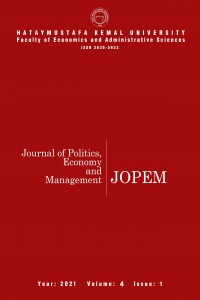Abstract
References
- Aydemir, A., & Yazici, H. (2019). Intergenerational education mobility and the level of development. European Economic Review 116(C), 160-185.
- Behrman, J.R., & Rosenzweig, M.R. (2002). Does increasing women’s schooling raise the schooling of the next generation? The American Economic Review 92(1), 323-334.
- Ben-Porath, Y. (1967). The production of human capital and the life cycle of earnings. Journal of Political Economy 75(4), 352-365.
- Bjorklund, A., Lindahl, M., & Plug, E. (2004). Intergenerational effects in Sweden: What can we learn from adoption data? Institute for the Study of Labor Discussion Paper, No: 1194. https://www.econstor.eu/bitstream/10419/20440/1/dp1194.pdf
- Black, S.E., Devereux, P.J., & Salvanes, K.G. (2008). Staying in the clasroom and out of the maternity ward? The effect of compulsory schooling laws on teenage births. The Economic Journal 118, 1025-1054.
- Duman, E. (2021a). Apple doesn’t fall far: intergenerational education mobility in Turkey. BİLTÜRK Journal of Economics and Related Studies 3(2), 51-65.
- Duman, E. (2021b). Intergenerational income mobility in Turkey. Optimum Ekonomi ve Yönetim Bilimleri Dergisi 8(2), 223-238.
- Johnson, G.E., & Stafford, F. P. (1973). School returns to quantity and quality of schooling. The Journal of Human Resources 8(2), 139-155.
- Holmlund, H., Lindahl, M., & Plug, E. (2011). The casual effect of parents’ schooling on children’s schooling: A comparison of estimation methods. Journal of Economic Literature 49(3), 615-651.
- Leibowitz, A. (1974). Home investments in Children. Journal of Political Economy 82(2), s111-s131. https://EconPapers.repec.org/RePEc:ucp:jpolec:v:82:y:1974:i:2:p:s111-s131. Mayer, S. E. (2010). Revisiting an old question: How much does parental income affect child outcomes? Focus 27(2), 21-26.
- Moulton, B. (1986). Random group effects and the precision of regression estimates. Journal of Econometrics 32(3), 385-397.
- Shea, J. (2000). Does parents’ money matters? Journal of Public Economics 77, 155-184.
- Solon, G. (1992). Intergenerational mobility in the United States. The American Economic Review 82(3), 393-408.
- Turkish Statistical Institute (2011). Household Budget Surveys. https://turkstatweb.tuik.gov.tr/MicroVeri/HBA2011/english/index.html
- Zimmerman, D.J. (1992). Regression toward mediocrity in economic stature. The American Economic Review 82(3): 409-429.
Abstract
This study analyzes the parental schooling and income impacts on their children’s outcomes that to a large extent determine the standard of living they achieve in the future: educational attainment and earnings. OLS estimations of child schooling and child earnings regressions are conducted. The results point to a strong positive relationship between children’s outcomes and their family background characteristics. The estimated strong intergenerational links promise children of highly educated and wealthy parents a high standard of living while doom children of low educated and poor parents to enjoy a lower quality of life. Persistency in intergenerational links found in this study proves to be an obstacle in overall economic development which may call for the government to generate policies that break the harmful intergenerational links either through providing equal opportunity in accessing education for low-income/low educated families’ children or through redistributing income across poor families that help them invest more in their children’s human capital.
References
- Aydemir, A., & Yazici, H. (2019). Intergenerational education mobility and the level of development. European Economic Review 116(C), 160-185.
- Behrman, J.R., & Rosenzweig, M.R. (2002). Does increasing women’s schooling raise the schooling of the next generation? The American Economic Review 92(1), 323-334.
- Ben-Porath, Y. (1967). The production of human capital and the life cycle of earnings. Journal of Political Economy 75(4), 352-365.
- Bjorklund, A., Lindahl, M., & Plug, E. (2004). Intergenerational effects in Sweden: What can we learn from adoption data? Institute for the Study of Labor Discussion Paper, No: 1194. https://www.econstor.eu/bitstream/10419/20440/1/dp1194.pdf
- Black, S.E., Devereux, P.J., & Salvanes, K.G. (2008). Staying in the clasroom and out of the maternity ward? The effect of compulsory schooling laws on teenage births. The Economic Journal 118, 1025-1054.
- Duman, E. (2021a). Apple doesn’t fall far: intergenerational education mobility in Turkey. BİLTÜRK Journal of Economics and Related Studies 3(2), 51-65.
- Duman, E. (2021b). Intergenerational income mobility in Turkey. Optimum Ekonomi ve Yönetim Bilimleri Dergisi 8(2), 223-238.
- Johnson, G.E., & Stafford, F. P. (1973). School returns to quantity and quality of schooling. The Journal of Human Resources 8(2), 139-155.
- Holmlund, H., Lindahl, M., & Plug, E. (2011). The casual effect of parents’ schooling on children’s schooling: A comparison of estimation methods. Journal of Economic Literature 49(3), 615-651.
- Leibowitz, A. (1974). Home investments in Children. Journal of Political Economy 82(2), s111-s131. https://EconPapers.repec.org/RePEc:ucp:jpolec:v:82:y:1974:i:2:p:s111-s131. Mayer, S. E. (2010). Revisiting an old question: How much does parental income affect child outcomes? Focus 27(2), 21-26.
- Moulton, B. (1986). Random group effects and the precision of regression estimates. Journal of Econometrics 32(3), 385-397.
- Shea, J. (2000). Does parents’ money matters? Journal of Public Economics 77, 155-184.
- Solon, G. (1992). Intergenerational mobility in the United States. The American Economic Review 82(3), 393-408.
- Turkish Statistical Institute (2011). Household Budget Surveys. https://turkstatweb.tuik.gov.tr/MicroVeri/HBA2011/english/index.html
- Zimmerman, D.J. (1992). Regression toward mediocrity in economic stature. The American Economic Review 82(3): 409-429.
Details
| Primary Language | English |
|---|---|
| Subjects | Economics |
| Journal Section | Research Articles |
| Authors | |
| Publication Date | June 28, 2021 |
| Submission Date | April 3, 2021 |
| Published in Issue | Year 2021 Volume: 4 Issue: 1 |



